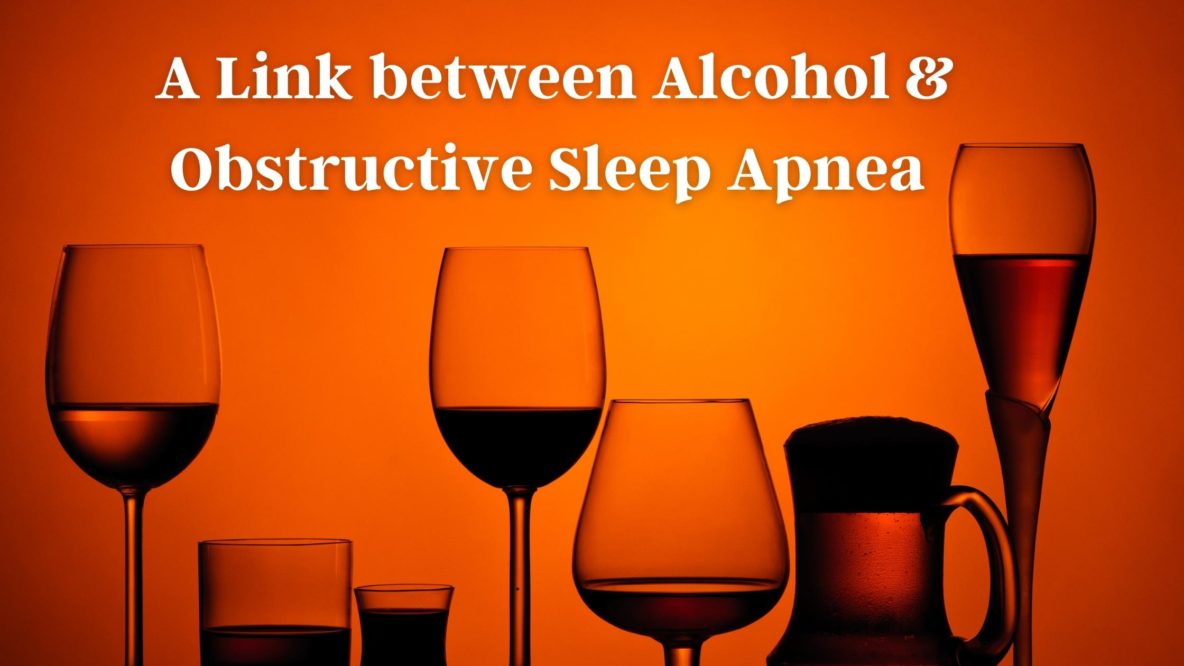A Link between Alcohol & Obstructive Sleep Apnea

- A Promising Paradigm Shift: New Research Challenges the CPAP-First Approach to OSA Treatment - September 5, 2023
- Understanding Sleep Meditation Techniques - July 30, 2021
- How Online Learning Has Affected Sleep for Students - July 13, 2021
Do you snore in your sleep? Maybe you wake up with a very dry mouth, or wake up in the middle of the night gasping for air. You may have obstructive sleep apnea that’s affecting your sleep.
There are a few things that can increase your risk of developing sleep apnea. If you’re over 40 you have a higher risk of sleep apnea. Being overweight can also contribute to sleep apnea, as well as hereditary factors like the shape of your neck and throat. Smoking and alcohol consumption can also lead to sleep apnea.
What Happens with Obstructive Sleep Apnea?
Obstructive sleep apnea is a disorder that affects your breathing at night. When you sleep, all the muscles in your body relax. But if you have sleep apnea, the muscles in your airway narrow more than they should. When they narrow, you may snore loudly and disrupt your partner. But when your airway is blocked, you’ll stop breathing for a second. This causes you to wake up many times in the night to tighten the muscles and restart the flow of air through your lungs.
Alcohol and Sleep
At first glance, alcohol might seem to improve sleep. It can help you fall asleep the moment your head hits the pillow. However, falling asleep quickly isn’t the sign of a good night’s sleep.
Drinking alcohol can disrupt your sleep cycles and decrease the amount of time you spend in REM sleep and deep sleep. Even if you’ve been sleeping for 7 to 9 hours, you may wake up feeling tired. You’ll spend more time in lightwave sleep, you’ll wake up more often, and you won’t get restful sleep.
A Link Between Alcohol and Obstructive Sleep Apnea
Excessive alcohol consumption is linked to obstructive sleep apnea. Alcohol can have a huge impact on your nightly breathing patterns. Alcohol can increase snoring and lead to disrupted breathing. For most people, alcohol further slows breathing and makes your breath shallow. As the muscles in your throat relax, and less air is passing through your lungs, your airway could close or even collapse.
For those with an alcohol use disorder, drinking in the evening further relaxes the muscles in the neck and throat. When these muscles relax the airway will collapse, leading to sleep apnea and restless nights.
Even if you don’t have a drinking disorder, moderate or heavy drinking can cause episodes of sleep apnea. For example, after one night of drinking you’re far more likely to snore in your sleep, or wake up many times in the night.
For anyone with sleep apnea, alcohol consumption can make the condition worse on the nights they drink, and leave you feeling even more exhausted in the morning. When you have a night of poor sleep due to obstructive sleep apnea, you may experience a severe drop in blood oxygen levels and a dangerous rise in carbon dioxide in the body.
Should You Drink?
Knowing that drinking alcohol can affect your sleep, should you drink? If you have obstructive sleep apnea, it’s best to reduce alcohol consumption, since it can make your sleep apnea much worse. We recommend that you finish your drink at least a couple of hours before heading to bed, and always use your sleep apnea treatment at night.
If you don’t have sleep apnea, drinking in moderation is usually fine. It’s a good idea to have your last drink at least a couple of hours before bed, so that the alcohol doesn’t affect your sleep quality. And remember that alcohol can lead to a poor night’s sleep with or without sleep apnea symptoms.
Sound Sleep Medical
Do you think you may have sleep apnea? Some common signs of obstructive sleep apnea include:
- Waking up with a very dry mouth
- Waking up with a sore throat
- Having frequent morning headaches
- Struggling to concentrate during the day
- Feeling extremely sleepy during the day
If these symptoms sound familiar, visit Sound Sleep Medical. Our team of sleep specialists can help you get to the bottom of your sleepless nights, and help you get the sleep you need. Whether you need sleep apnea treatment or could benefit from changing your sleep hygiene, we’ll help you get the sleep you need every night.
